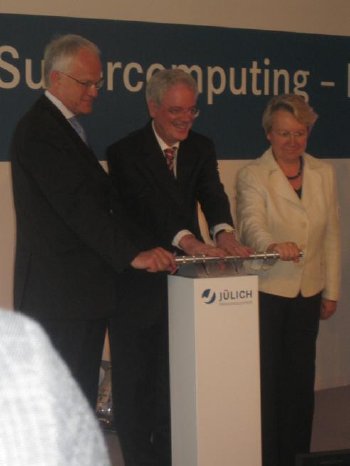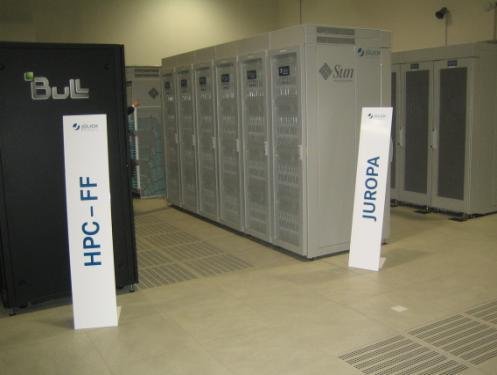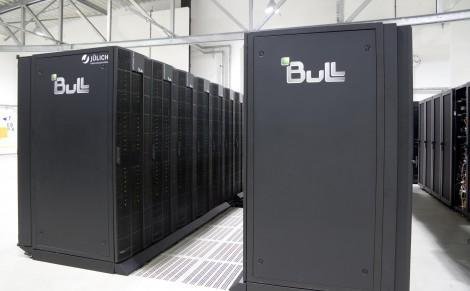Clustercomputer JUROPA
The second new supercomputer named JUROPA (which stands for Juelich Research on Petaflop Architectures) will be used pan European wide by more than 200 research groups, in particular for data-intensive applications.
JUROPA is based on a cluster configuration of Sun Blade servers, Intel Nehalem processors and Cluster Operation Software ParaStation from ParTec Cluster Competence Center GmbH, Munich.
The system was jointly developed by experts of the Jülich Supercomputing Center and implemented with partner companies Bull, Sun, Intel, Mellanox and ParTec. It consists of 2208 compute nodes with a total computing power of 207 Teraflop / s and was sponsored by the Helmholtz Community.
Fusion Computer HPC-FF
The concept for the third supercomputer HPC-FF (High Performance Computing - for Fusion) was drawn up by the team headed by Dr. Thomas Lippert, director of the Jülich Supercomputing Centre, optimized and implemented together with the partner companies Bull, SUN, Intel, Mellanox and ParTec. "HPC-FF is closely coupled to the JuRoPA system. So, if required fusion researchers can access computing power totaling 300 teraflop/s," says Prof. Dr. Dr. Lippert, director of the Jülich Supercomputer Centre. The new best-of-breed system, one of Europe's most powerful, will support advanced research in many areas such as health, information, environment, and energy. The HPC-FF supercomputer is a best-of-breed cluster system. It will consist of 1,080 computing nodes each equipped with two Nehalem EP Quad Core processors from Intel. The grand total of 8,640 processors will have a clock rate of 2.93 GHz each, they will be able to access 24 gigabytes of total main memory. Their total computing power of 101 teraflop/s corresponds at the present moment to 30th place in the list of the world's fastest supercomputers. The combined cluster will achieve 300 teraflops/s computing power and the rating in the Top 500 list to be published soon at the next ISC 09 in Hambug will be seen. A rank among the top 10 supercomputers in the world could be expected. Infiniband ConnectX QDR from the Israeli company Mellanox is used as node interconnect. The administrative infrastructure is based on servers of the type NovaScale R422-E2 from the French supercomputer manufacturer Bull, who will supply the compute hardware and on a SUN ZFS/Lustre Filesystem. The cluster operating system "ParaStation V5" is supplied by the Munich software company ParTec. ParTec's ParaStationV5 cluster operating system combined with Quad Data Rate ( 40 Gb/s) InfiniBand-based high-performance systems delivers an integrated, easy to use and reliable compute cluster environment," says Hugo Falter, COO of ParTec GmbH. "This cluster will provide the foundation for the next generation cluster computers to the worldwide community of users and scientists." HPC-FF is being funded by the European Commission (EURATOM), the member institutes of EFDA and Forschungszentrum Jülich.
Complete System
3288 compute nodes ; 79 TB main memory; 26304 cores; 308 Teraflops peak performance
ParaStation and GridMonitor - innovative software solutions not only for Petaflop Computers
The cluster operating and management software ParaStation and the tool Grid Monitor are playing a significant role as the productive pre-requisite for high-performance clusters. Experience of many years of ParTec in the development of innovative software solutions for cluster computing constitute an essential precondition for the know-how to enable "High Productivity Cluster Computing". The driving power behind our development of Operating and Managing Software for High Performance Solutions is the motivation to unburden the customer from many daily time consuming problems of cluster administration and make it as productive as possible by providing our service and support. "Science and industry increasingly rely and profit from simulations on computers of the highest performance class," explained Prof. Thomas Lippert, Director of the Jülich Supercomputing Centre." "Our partnership with Jülich, Bull, Mellanox, SUN and Intel, marks a significant step in the development of commodity supercomputer systems," says Hugo Falter, COO of ParTec GmbH "We expect this alliance to deliver key components for general-purpose petascale cluster systems in Europe."



